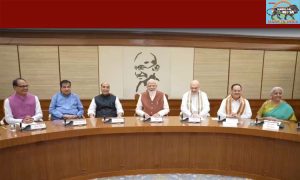Cabinet approves the Nutrient Based Subsidy rates for Rabi 2025- 26 on Phosphatic and Potassic fertilizers
The Union Cabinet, chaired by the Prime Minister Shri Narendra Modi, today approved the proposal of the Department of Fertilizers for fixing the Nutrient Based Subsidy (NBS) rates for RABI Season 2025-26 (from 01.10.2025 to 31.03.2026) on Phosphatic and Potassic (P&K) fertilizers. The tentative budgetary requirement for Rabi season 2025-26 would be approximately Rs. 37,952.29 crore. This is approximate Rs. 736 crore more than the budgetary requirement for Kharif season 2025.
The subsidy on P&K fertilizers including Di Ammonium Phosphate (DAP) and NPKS (Nitrogen, Phosphorus, Potash, Sulphur) grades will be provided based on approved rates for Rabi 2025-26 (applicable from 01.10.2025 to 31.03.2026) to ensure smooth availability of these fertilizers to the farmers at affordable prices.
Benefits:
- Availability of fertilizers to farmers at subsidized, affordable and reasonable prices will be ensured.
- Rationalization of subsidy on P&K fertilizers in view of recent trends in the international prices of fertilizers and inputs.
Background:
Government is making available 28 grades of P&K fertilizers including DAP to farmers at subsidized prices through fertilizer manufacturers/importers. The subsidy on P&K fertilizers is governed by NBS Scheme w.e.f. 01.04.2010. In accordance with its farmer friendly approach, the Government is committed to ensure the availability of P&K fertilizers to the farmers at affordable prices. In view of the recent trends in the international prices of fertilizers & inputs like Urea, DAP, MOP and Sulphur, Government has decided to approve the NBS rates for Rabi 2025-26 effective from O 1.10.2025 to 31.03.2026 on Phosphatic and Potassic (P&K) fertilisers including DAP and NPKS grades. The subsidy would be provided to the fertilizer companies as per approved and notified rates so that fertilizers are made available to farmers at affordable prices.
Cabinet approves Terms of Reference of 8th Central Pay Commission
The Union Cabinet, chaired by the Prime Minister Shri Narendra Modi, today approved the Terms of Reference of 8th Central Pay Commission.
The 8th Central Pay Commission will be a temporary body. The Commission will comprise of one Chairperson; One Member (Part Time) and one Member-Secretary. It will make its recommendations within 18 months of the date of its constitution. It may consider, if necessary, sending interim reports on any of the matters as and when the recommendations are finalized. While making the recommendations the Commission will keep in view the followings:
i. The economic conditions in the country and the need for fiscal prudence;
ii. The need to ensure that adequate resources are available for developmental expenditure and welfare measures;
iii. The unfunded cost of non-contributory pension schemes;
iv. The likely impact of the recommendations on the finances of the State Governments which usually adopt the recommendations with some modifications; and
v. The prevailing emolument structure, benefits and working conditions available to employees of Central Public Sector Undertakings and private sector.
Background:
The Central Pay Commissions are periodically constituted to go into various issues of emoluments structure, retirement benefits and other service conditions of Central Government employees and to make recommendations on the changes required thereon. Usually, the recommendations of the pay commissions are implemented after a gap of every ten years. Going by this trend, the effect of the 8th Central Pay Commission recommendations would normally be expected from 01.01.2026.
The Government had announced formation of the 8th Central Pay Commission in January, 2025 to examine and recommend changes in the Salaries and other benefits of Central Government employees.
